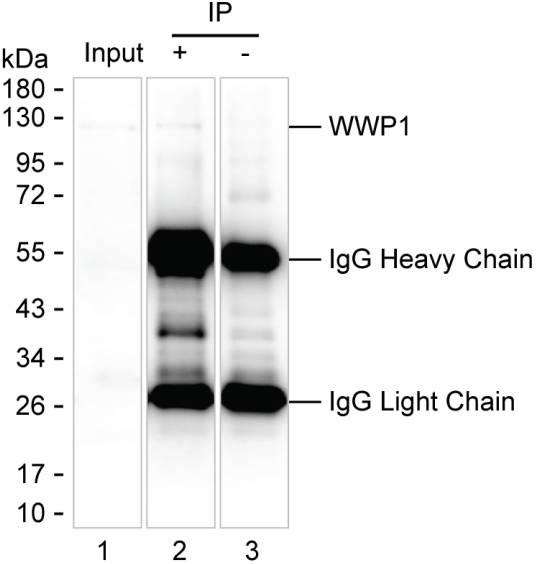
| WB | 咨询技术 | Human,Mouse,Rat |
| IF | 1/100-1/200 | Human,Mouse,Rat |
| IHC | 咨询技术 | Human,Mouse,Rat |
| ICC | 技术咨询 | Human,Mouse,Rat |
| FCM | 咨询技术 | Human,Mouse,Rat |
| Elisa | 咨询技术 | Human,Mouse,Rat |
| Host/Isotype | Mouse IgG2a |
| Antibody Type | Primary antibody |
| Storage | Store at 4°C short term. Aliquot and store at -20°C long term. Avoid freeze/thaw cycles. |
| Species Reactivity | Human |
| Immunogen | Purified recombinant fragment of human WWP1 |
| Formulation | Purified antibody in PBS with 0.05% sodium azide |
+ +
以下是关于WWP1抗体的3篇代表性文献概览:
---
1. **文献名称**:*WWP1-mediated PTEN ubiquitination regulates its nuclear localization and tumor suppressor function*
**作者**:Wang et al. (2017)
**摘要**:研究揭示了WWP1通过泛素化修饰PTEN调控其核定位的机制,利用WWP1抗体在细胞系中验证了WWP1与PTEN的相互作用,为靶向WWP1的癌症治疗提供依据。
2. **文献名称**:*Targeting the E3 ubiquitin ligase WWP1 in cancer*
**作者**:Chen et al. (2020)
**摘要**:探讨了WWP1在肿瘤发生中的关键作用,通过抗体免疫沉淀技术发现WWP1与多个致癌蛋白结合,提出抑制WWP1可成为潜在抗癌策略。
3. **文献名称**:*Development of a WWP1-FOXP3 interaction inhibitor for cancer immunotherapy*
**作者**:Harrigan et al. (2021)
**摘要**:开发了一种靶向WWP1-FOXP3通路的小分子抑制剂,利用WWP1抗体验证了抑制剂对WWP1功能的阻断效果,为增强抗肿瘤免疫应答提供新思路。
---
以上文献覆盖了WWP1在肿瘤调控、靶向治疗及免疫治疗中的应用,展示了抗体在机制研究及药物开发中的关键作用。如需具体文献链接或补充,可进一步提供研究方向。
The WWP1 antibody is a tool used to detect WWP1 (WW domain-containing E3 ubiquitin protein ligase 1), a member of the NEDD4 family of HECT-type E3 ubiquitin ligases. WWP1 plays a critical role in regulating protein ubiquitination, a post-translational modification that directs substrates toward degradation, localization, or functional modulation. Structurally, WWP1 contains an N-terminal C2 domain for membrane binding, multiple WW domains for substrate recognition, and a C-terminal HECT domain responsible for ubiquitin transfer. It interacts with targets such as PTEN, SMADs, and NOTCH, influencing pathways involved in cell growth, apoptosis, and differentiation.
WWP1 is implicated in various diseases, particularly cancer. Studies highlight its dual role as both an oncogene and tumor suppressor, depending on cellular context. Overexpression of WWP1 is observed in prostate, breast, and lung cancers, where it can promote tumorigenesis by destabilizing tumor suppressors. Conversely, WWP1 loss may drive genomic instability. Dysregulation of WWP1 is also linked to neurodegenerative disorders and developmental defects.
WWP1 antibodies are essential for studying its expression, localization, and interactions. They are utilized in techniques like Western blotting, immunoprecipitation, and immunohistochemistry. Commercially available antibodies vary in clonality, epitope specificity, and host species. Validating antibody specificity using knockout controls is crucial due to potential cross-reactivity with homologous proteins like WWP2. Recent research explores WWP1 as a therapeutic target, with inhibitors under investigation for cancer treatment. These antibodies thus serve as both research tools and potential companions in developing targeted therapies.
×